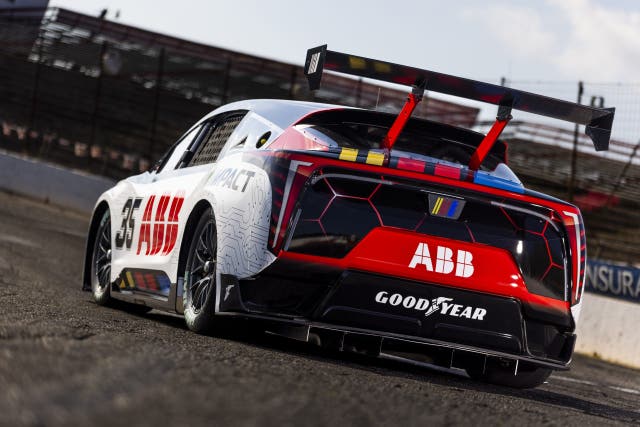Bob Pockrass
FOX NASCAR Insider
CHICAGO — NASCAR unveiled its electric vehicle prototype Saturday as a symbol of its commitment to try to reach zero carbon emissions across its core operations by 2025.
That electric vehicle might end up being more of a symbol than a reality when it comes to actual racing.
With a possible focus on hydrogen-powered combustible engines as being the answer to improving its carbon footprint, NASCAR will continue to explore whether an electric avenue is best.
While NASCAR had considered having exhibition electric vehicle races with each manufacturer building cars, so far the one vehicle it unveiled Saturday during its Chicago street course weekend is its only one. No exhibition races are planned.
“I’m not sitting here saying we’re going to announce a series,” NASCAR Senior Vice President and Chief Racing Development Officer John Probst said. “As much as anything, it’s about us exploring what our future could be. … As we learn, we’ll be in the driver’s seat wherever our future takes us.”
The three current NASCAR competing manufacturers — Chevrolet, Ford and Toyota — collaborated in the design of the car, and no other potential NASCAR manufacturer was involved. The car does already have a sponsor as NASCAR announced that electrification and automation company ABB has become its first partner as part of its sustainability mission.
“From our perspective, the idea is to just be prepared for whatever the future holds,” Probst said. “We’re looking at all things combustion from sustainable fuels to hydrogen to things electrified from hybrids to … our battery electric car.”
Former Cup driver David Ragan has been the test driver, including for a three-day test at Martinsville for the car, which has a modified chassis of the current Next Gen car used in Cup. The steering, suspension, brakes, and wheels are all from the current Cup car. The powertrain can produce 1,000 kilowatts at peak. Braking converts kinetic energy into power, which is common in many of the hybrid engines used in other racing series.
With no series set, the NASCAR electric vehicle prototype uses a non-branded engine and none of the manufacturers have developed an engine specifically for it.
There are two things that certainly would get NASCAR fans’ attention:
–The lack of sound with no combustible engine.
–The large wing that is raised high above the car, which is developed as a cross-over utility vehicle, so it is a few inches taller than the current Cup car and would have needed a huge rear spoiler to generate the downforce necessary.

First look at NASCAR’s new EV prototype.
“For my whole life. I’ve driven cars that made noise that you heard certain things, you smelled certain smells that what was really different with this car,” Ragan said.
“At a track like Martinsville where you’re right against the wall down the straightaways, you’re always used to hearing the baffling of the exhaust against the wall and you could kind of just know how close you are to the wall. … I could hear the tires squealing or chattering mid-corner. You could smell the brakes a lot more.”
NASCAR officials know much of their fanbase would resist a move from a combustion engine but also want to follow the lead of where their participating manufacturers are going with their passenger vehicles.
“There’s a long, long road ahead for the combustion engine, be it powered from sustainable fuel, or hydrogen, for that matter — that’s something else that we’re very interested in,” Probst said. “But then there’s obviously also the electrification side of that, be it hybrid … [and] also the battery-electric [powered vehicles].”
Car manufacturers often use racing to help develop technologies and to highlight their current high-performance technology.
“On the consumer side, carbon is the enemy, right?” said Toyota Racing Development general manager Tyler Gibbs. “On the consumer side, we’re going through a portfolio approach of a variety of different vehicles [from EVs to hydrogen-fuel cell]. … On the motorsport side, we see the internal combustion engine being around for a long time and motorsports just by the nature of the way that it works at all.
“Hydrogen is a big piece for us. Carbon-neutral fuels are a big deal for us.”
Probst couldn’t stress enough that the electric vehicle is still exploratory in nature and whether a series ever happens is still to be determined. There has been speculation that NASCAR’s Xfinity Series could become its electric stock-car series.
“I wouldn’t sit here today and say we’ll never do a series,” Probst said. “I’m just saying that right now. I don’t want to create the expectation that the series is going to be announced for next year. That’s not the case. We’re not saying no to it either.
“But I just think it’s an opportunity for us to do something that is meaningful in the sense that we’re developing new technology for our car [and then] judge the feedback from our fans. At the end of the day, that’s all we measure ourselves by ultimately. We want to be relevant to the OEMs [manufacturers], but if we’re relevant to them, and no one watches, they’re going to look at us and go, ‘Why are we messing around over there.’”

First look at NASCAR’s new EV prototype.
Bob Pockrass covers NASCAR for FOX Sports. He has spent decades covering motorsports, including over 30 Daytona 500s, with stints at ESPN, Sporting News, NASCAR Scene magazine and The (Daytona Beach) News-Journal. Follow him on Twitter @bobpockrass.

Get more from NASCAR Cup Series Follow your favorites to get information about games, news and more
